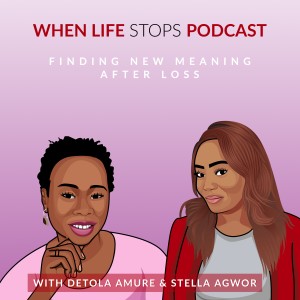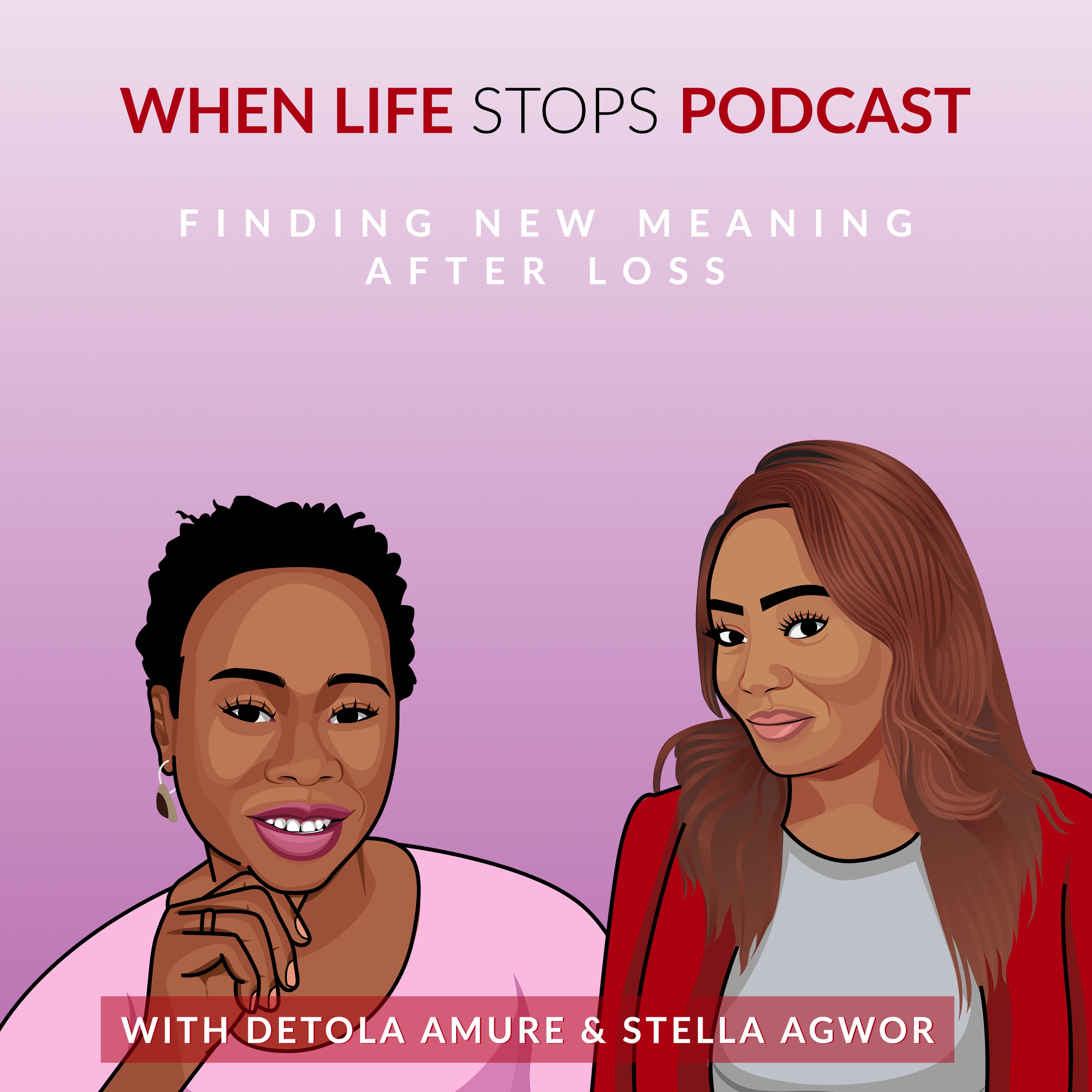Episodes

Wednesday Aug 12, 2020
Episode 3: What Grief Really Is.
Wednesday Aug 12, 2020
Wednesday Aug 12, 2020
Welcome to episode 3 of when life stops, a podcast on finding new meaning after loss. In the last episode, we talked about common grief myths, the falsehood around grief, and what we knew.
Today Stella and Detola dig deep into what grief really Is
We share 3 definitions of Grief
We say it is the normal and natural reaction to significant emotional loss of any kind.
secondly, according to the Grief Recovery method written by John W James, and Russell Friedman
Grief is the conflicting feelings caused by the end of, or change in, a familiar pattern of behavior.
The last definition of grief is feeling of reaching out for someone who has always been there, only to find when you need them one more time, they are no longer there.
We discuss that there are over 43 losses that are considered to invoke grief eg.
Death, Divorce, Retirement, Moving, Pet Loss, Financial change, Loss of health, Legal Problems, Empty nest, End of Addiction, Starting School, Redundancy.
Some examples of intangible losses that lead to grief:
Loss of trust, loss of innocence, loss of safety, loss of childhood, loss of control, loss of faith, Loss of fertility
And we reassure our listeners that whatever loss they have experienced what they are feeling is normal.
We tackle the grave misconception that there are stages of grief. The fact is there are no stages. Grief cannot be neatly categorized. Elizabeth Kubler Ross’ work was on Death & Dying, not grief. She was very specific about this distinction in her books but the media and the universities have attached her work to grief. This common misinformation has confused and hurt many grievers throughout the years.
We emphasize that there are no stages to grief, every grief is individual and unique.
We also share the typical responses to grief such as:
Reduced concentration
A sense of numbness
Disrupted sleeping patterns
Changed eating habits
Roller coaster of emotional
We talk about how grief is often mislabelled as ADHD, Depression, PTSD and many other pathological conditions. We share that mental health professionals that grief recovery specialists work with have found that although their clients come to them with another presenting issue, almost all of them have unresolved grief as the underlying problem and If you misdiagnose it means you will mistreat. These wrongly labeled grievers are often incorrectly put on various medications, which get in the way of recovering from loss.
And this shows that there is unresolved grief everywhere.
A study of 8800 US mental health clients established that a large percentage of people diagnosed as depressed and placed on antidepressant drugs are not clinically depressed. They are actually experiencing unresolved grief due to prior losses in their lives.
And any grief that is not embraced, and worked through would end up being covered, buried and the fact that time has elapsed doesn't mean healing has taken place.
We remind our listeners again that time does not heal wounds, it is facing it and taking actions that guarantee healing.
So how then do people know if they are experiencing unresolved grief?
We list the 5 signs that show this
1. If you are unwilling to think about or talk about someone who has died or express feelings about any other losses.
2. If fond memories turn painful, you may be experiencing unresolved grief.
3. If you want only to talk about the positive aspects of the relationship, you may be incomplete or experiencing unresolved grief.
4. If you want only to talk about the negative aspects of the relationship, you may be incomplete or experiencing unresolved grief.
5. Unresolved grief may be at the root of any fear associated with the thoughts or feelings about a relationship.
We encourage anyone listening who feels they may have unresolved grief that they too can recover and find new meaning to life after experiencing grief. You can actually recover from grief.
Stella listed some steps you can take to recover from grief.
1. The first step is to face it, grief is healthy, and realize that you are not alone, God is with you,
2. Grief is healed in community, you need people,
3. Take action, start with admitting what it is you lost, identify other losses you never grieved,
4. Talk to God about how you feel, express yourself before God(e.g journaling and blogging and just talking to God and asking him lots of questions),
5. Stay grounded in the love of God. (remind yourself that you are loved, and because you love God, all things would work together for my good)ps 23.4. Roms 8.28
Detola shares that
Recovery is being able to enjoy fond memories without having them turn painful.
Recovery means acquiring the skills we should have been taught as a child. These skills allow us to deal with loss directly.
Although recovery from significant emotional loss is not an easy task. Taking the actions that lead to recovery will require open-mindedness, willingness, and courage.
Recovery from loss is achieved by a series of small and correct choices made by the griever.
We round up by saying again that you are not alone on this journey, and we encourage grievers to acknowledge how they feel, journal their thoughts, and always be emotionally honest with themselves and others.
We share how to lament before God and Rick Warren sums it nicely, he says we must go to God and complain to him and not about him, tell him what we think is unfair or painful,
Appeal to his nature
Remind God of his words
Express total trust in God
We know that discussions around grief can be hard but we are available to help and support anyone who would require our services and you can reach us by sending us an email at hello@whenlifestops.org
For more information about us, you can go to our website
https://www.instagram.com/stellaagwor/
https://www.instagram.com/detolaamure/
If you have found this episode valuable we ask that you please share, like, comment, and subscribe to this podcast on whatever podcast app that you are listening from.
God bless you and see you next week.


Comments (0)
To leave or reply to comments, please download free Podbean or
No Comments
To leave or reply to comments,
please download free Podbean App.